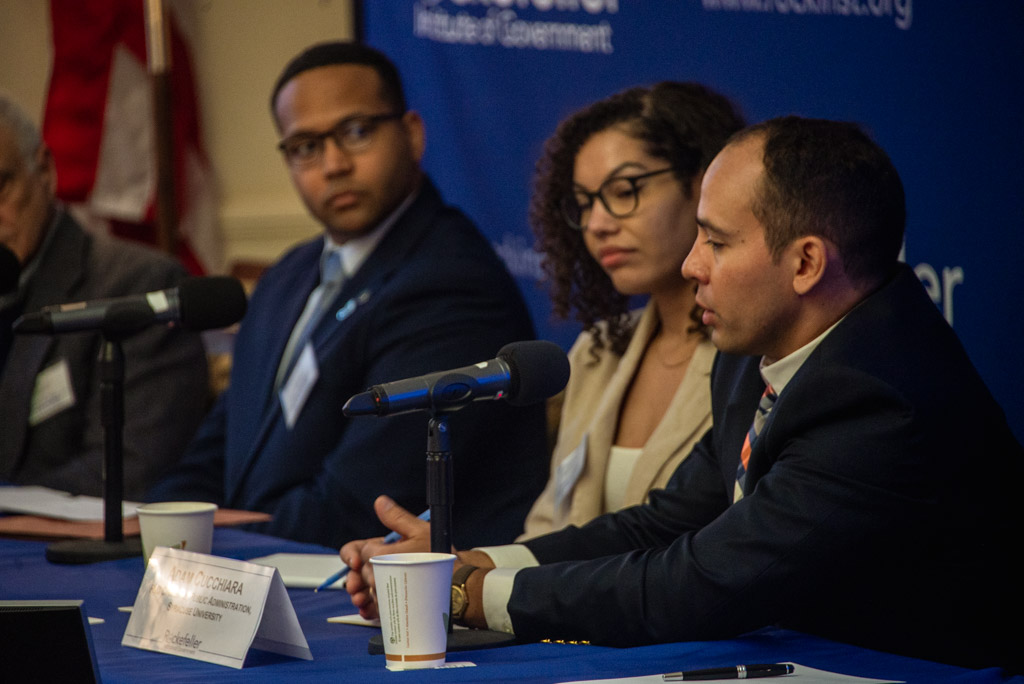
The Richard P. Nathan Public Policy Fellowship seeks to connect cutting-edge policy expertise to public problems and the policy community that tries to address these problems. Fellows work closely with the Rockefeller Institute’s expert researchers on a variety of projects, including in the areas of healthcare, local government, fiscal policy, education, law, and social policy.
The one-year fellowship, named after longtime Rockefeller Institute of Government Director Richard P. Nathan, connects Rockefeller Institute staff and researchers with professionals in the higher education community, researchers, practitioners, and retirees in a variety of fields who demonstrate a passion for working on pressing public policy issues of the day to analyze and address public policy problems. Fellows produce reports, policy briefs, blogs, or public forums or webinars, including the publication of commentary pieces on the Rockefeller Institute’s website.
Applicants are expected to be selected by the week of July 21, 2025. View the full call for applications, which included information on how to apply.
The Richard P. Nathan Public Policy Fellowships are unpaid, although a small amount of funding may be available for research-related travel or other items related to fellowship work for the Rockefeller Institute. Fellow participation can be in person or virtual; full-time residence at the Institute’s headquarters in Albany, New York, is not required. Fellows will have access to the Rockefeller Institute’s facility, staff, and space for events, and office space can be made available for those fellows who wish to use it on a temporary and periodic basis when in Albany.
Appointments to the fellowship are for a period of one year, starting in September 2025. Fellows are expected to produce reports, policy briefs, blogs, or public forums or webinars, including the publication of commentary pieces on the Rockefeller Institute’s website. The Rockefeller Institute’s staff experts will be available for consultation and coaching throughout the fellowship. Three cohort meetings will occur on Zoom: one at the beginning for orientation and to discuss projects, one at the midway point to discuss progress, and one at the end to wrap up the fellowship. Research products can be published by the Rockefeller Institute throughout the year-long fellowship.
Questions about the program can be directed to Zan Strumfeld at [email protected].
Lisa Parshall: Lisa organized a local government conference in 2019 at the Institute (that is now an annual event—the Local Government Lab) and wrote a policy brief on village dissolution in New York State.
Matthew Adams: Matthew presented his work on policies local government could implement to promote the adoption of green concrete at our 2021 Local Government Lab. He wrote a policy brief and recorded a Policy Outsider podcast discussing his work with the Village of Hastings-on-Hudson.
Rebecca S. Natow: Rebecca wrote blogs on federal higher education policies and discussed her work in an episode of our podcast. She also published a Rockefeller Institute report on state and federal funding partnerships to support higher education.
Kaitlin Stack Whitney: Kaitlin presented her research on highway right-of-way (ROW) uses at the 2021 Local Government Lab. She published a blog post on innovative uses for ROWs and followed up with a podcast episode.
Staci Zavatarro: Staci wrote a blog post on the role of deathcare systems in the aftermath of the COVID-19 pandemic. She recorded a podcast to expand on the topic and highlight the logistical challenges that coroners and medical examiners faced.